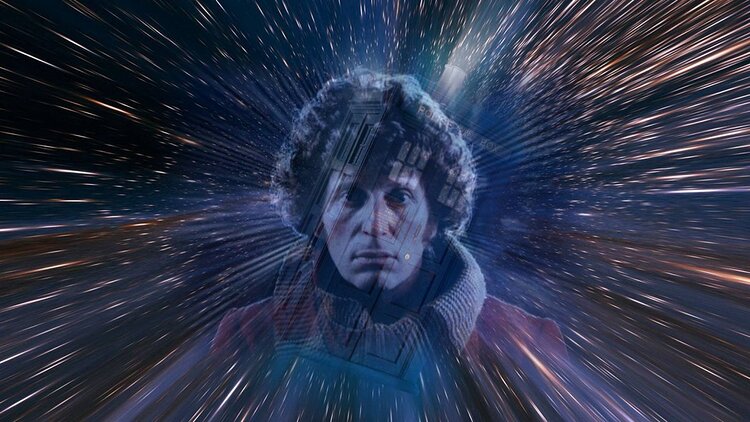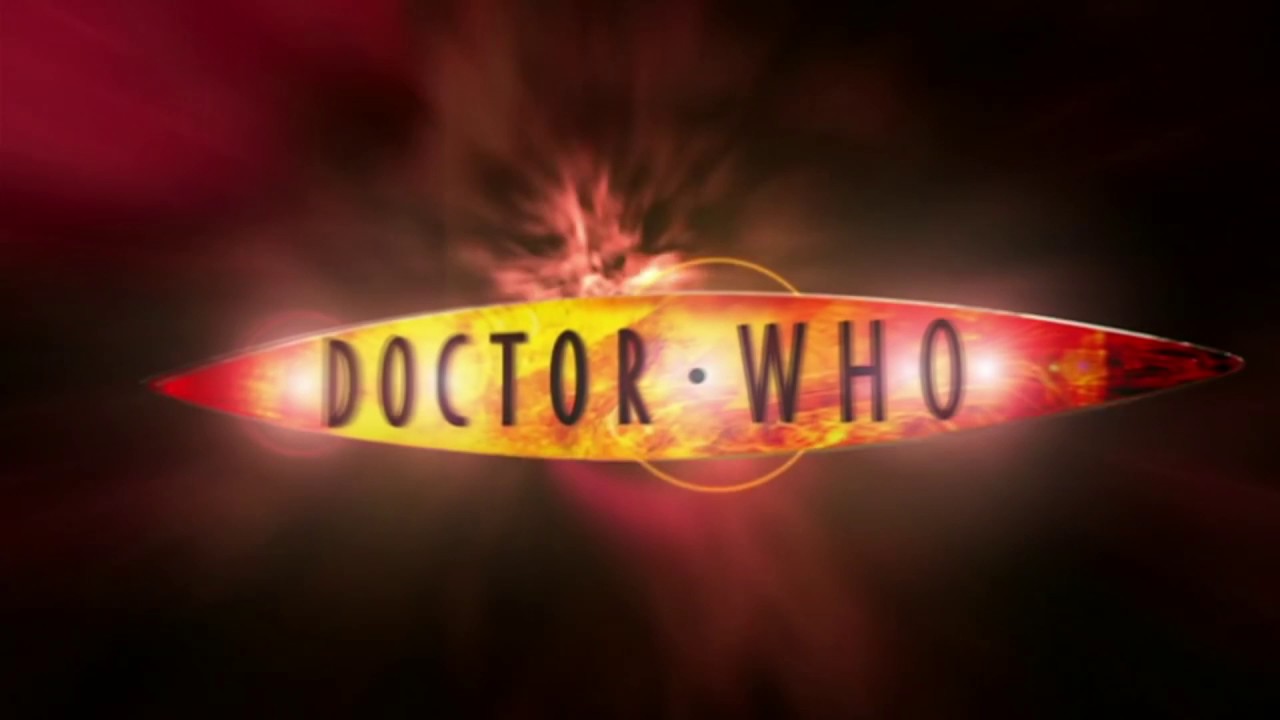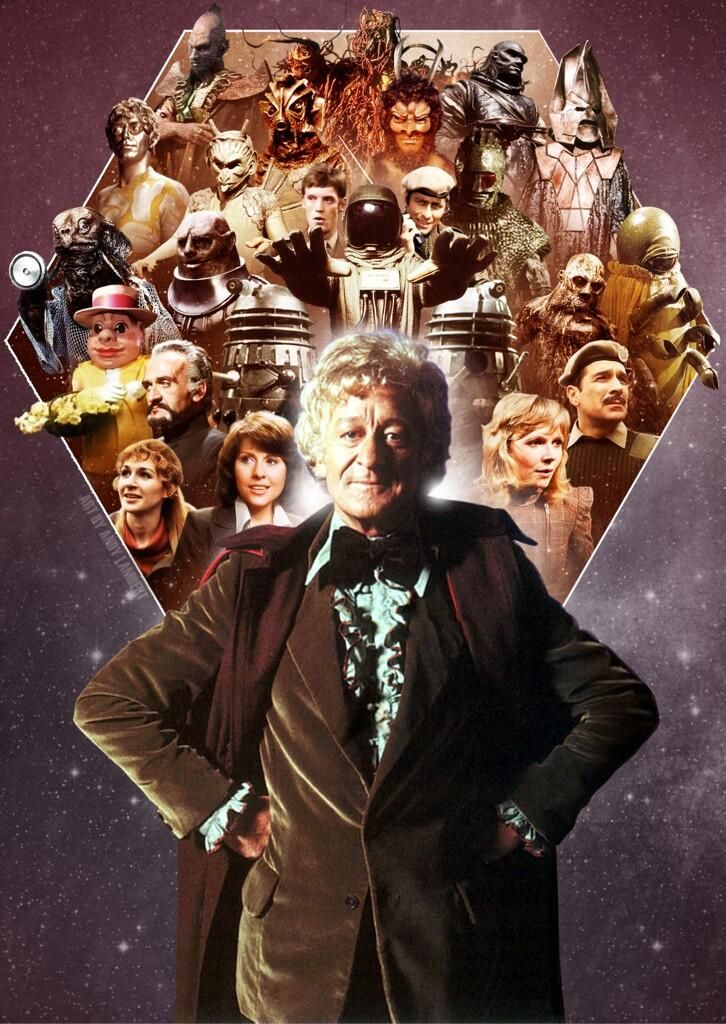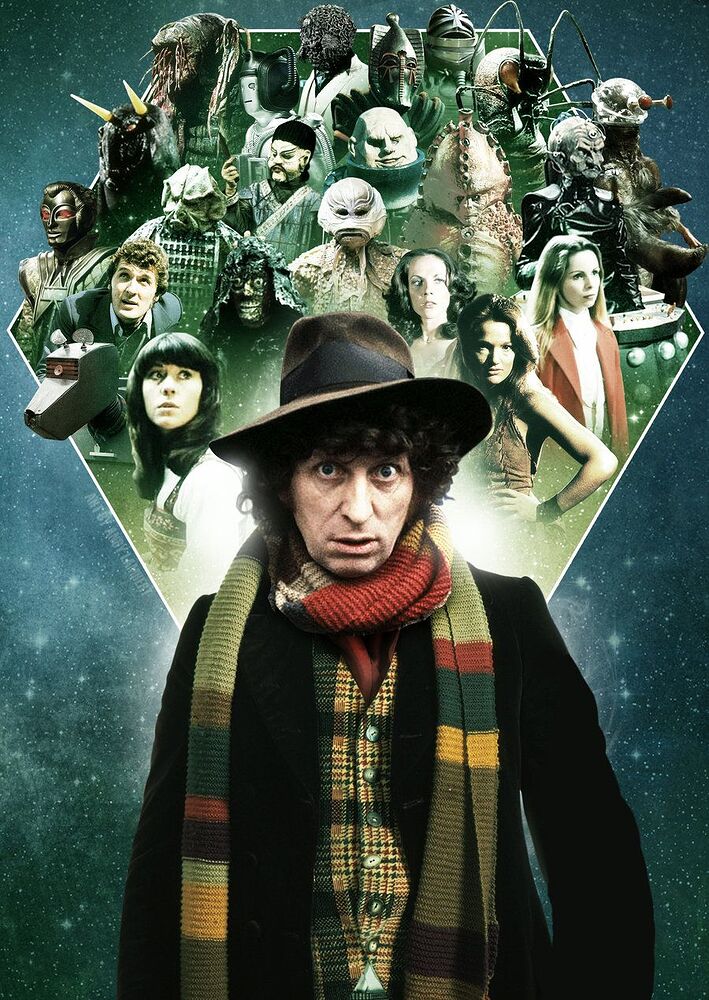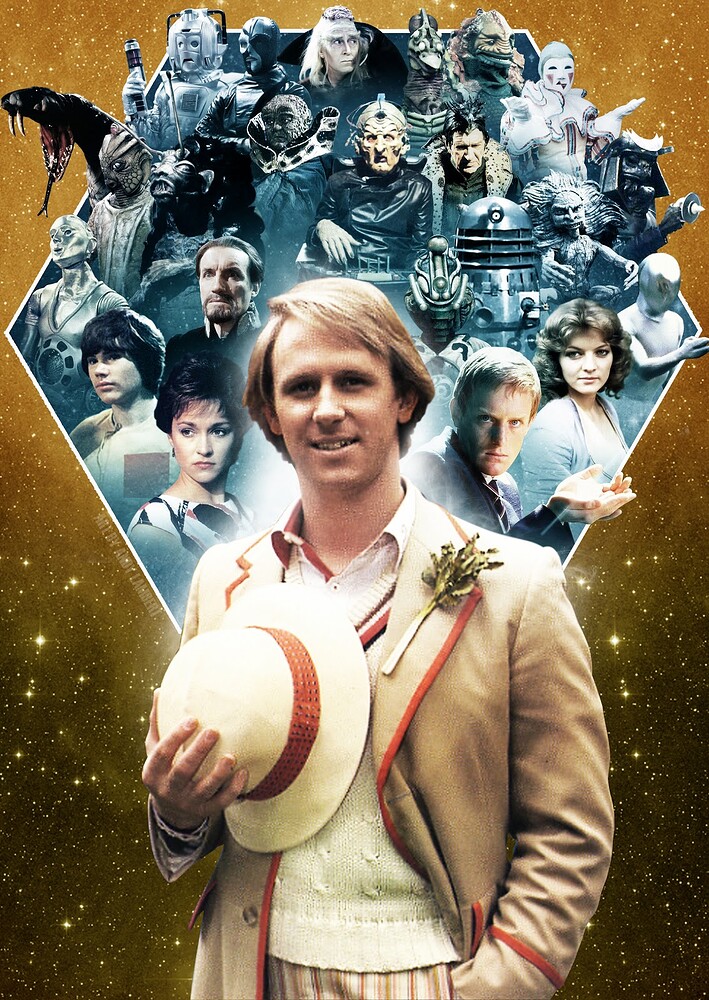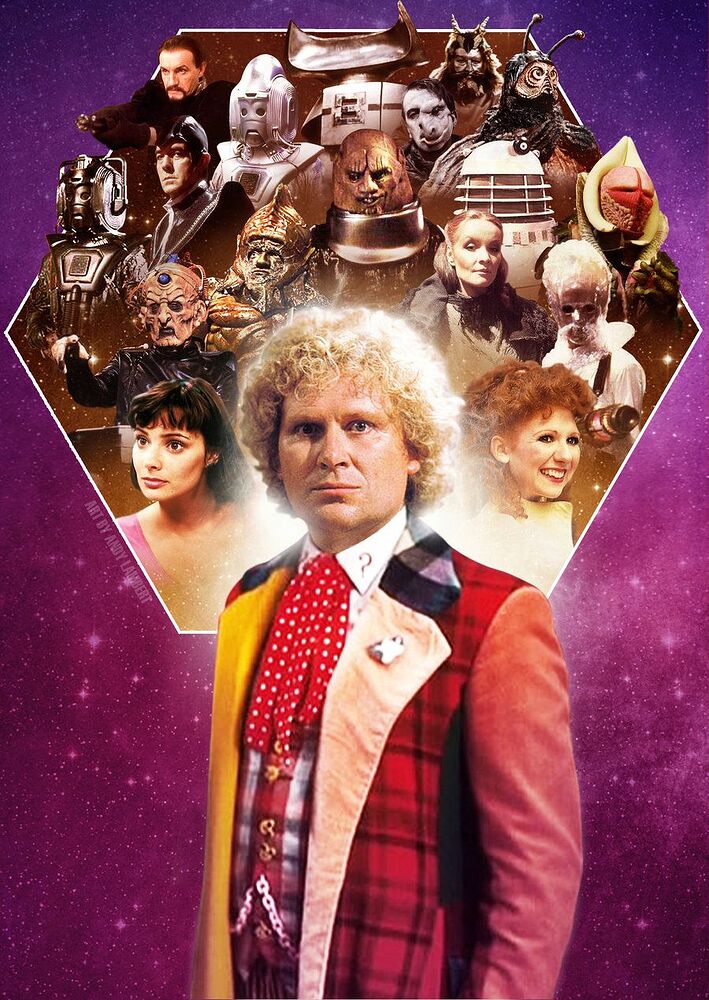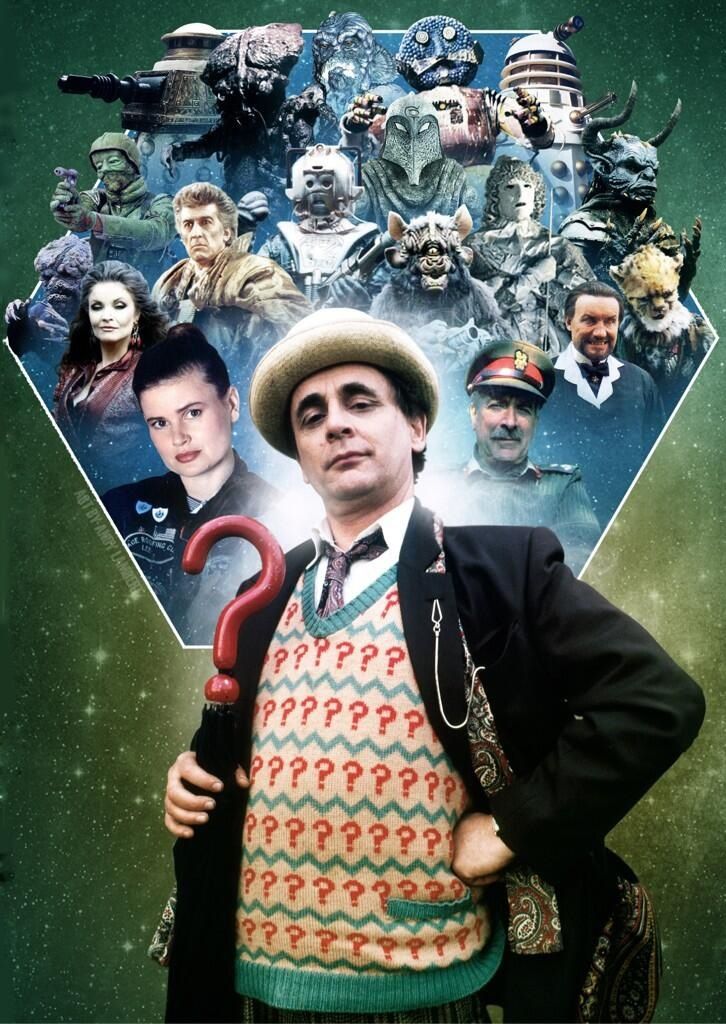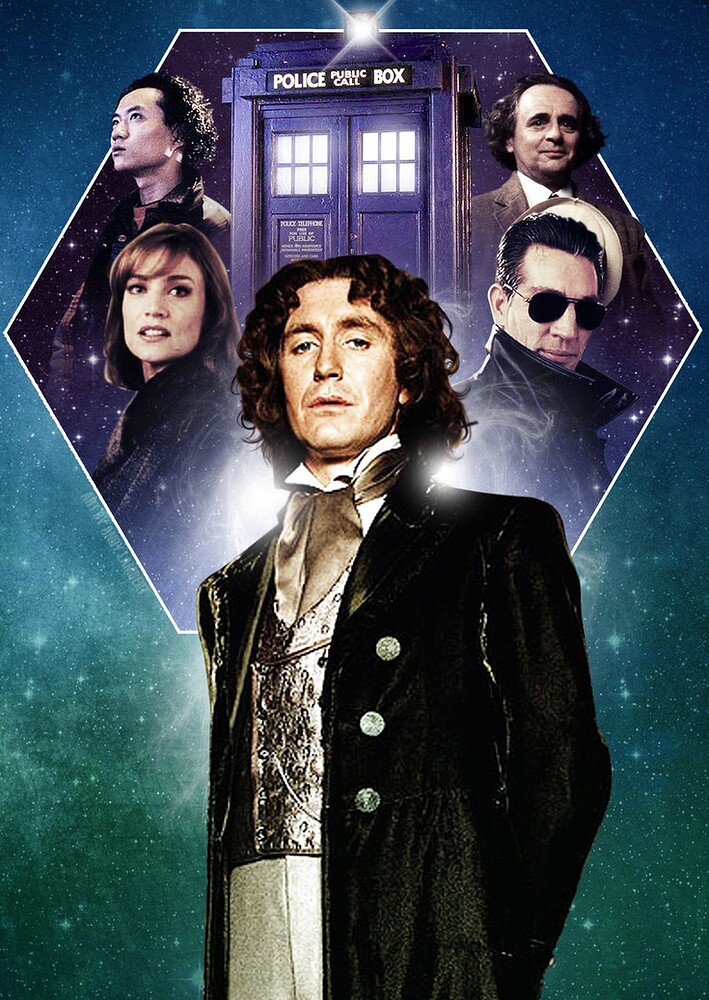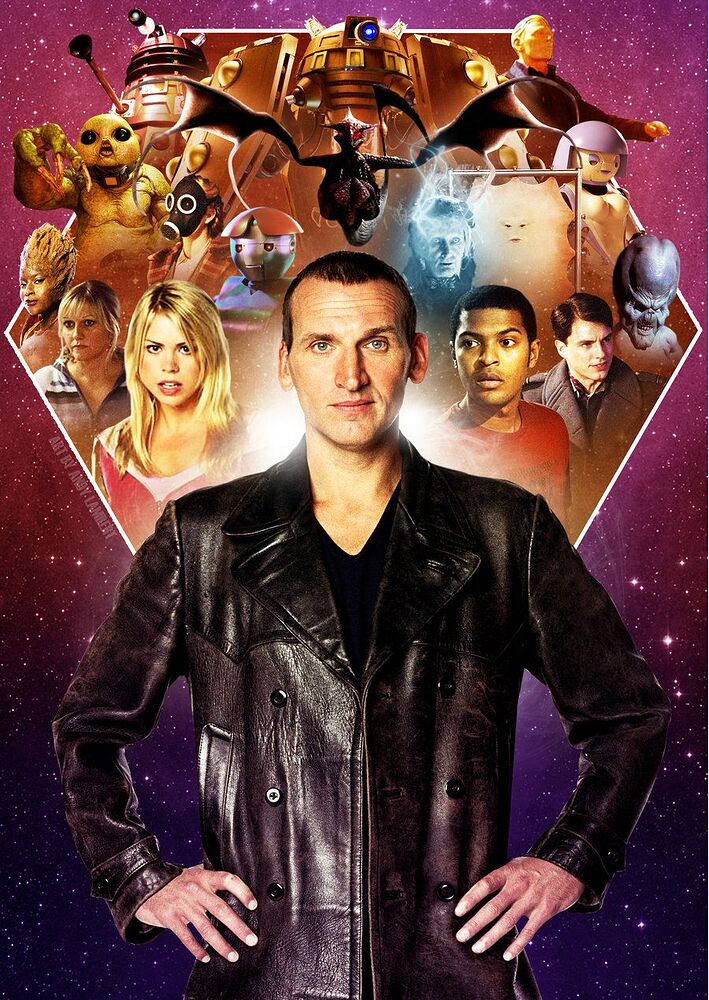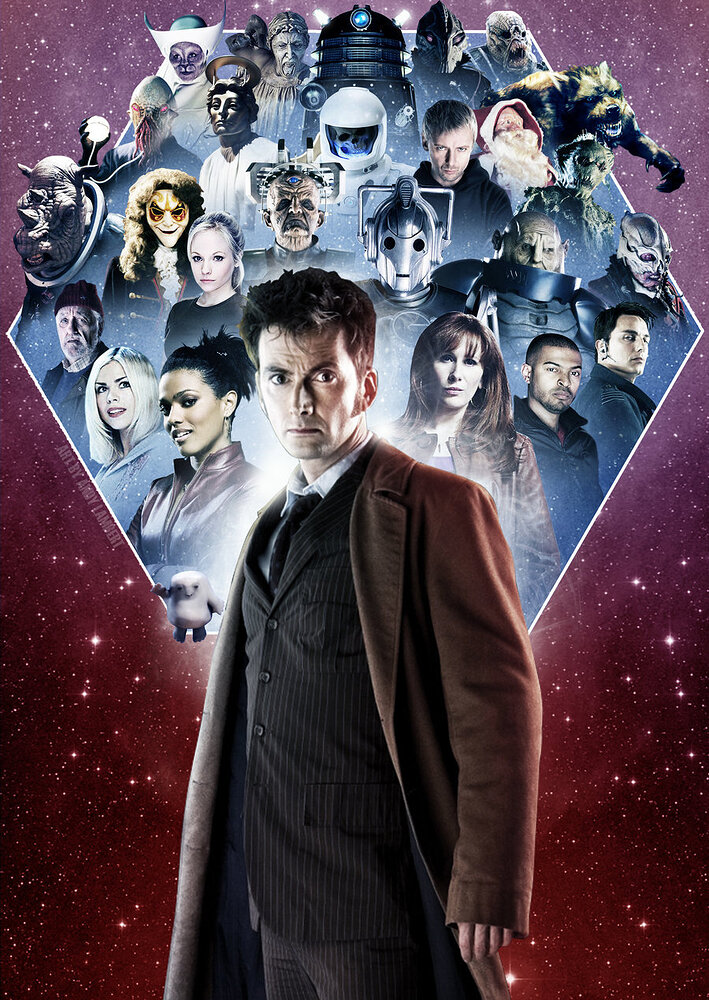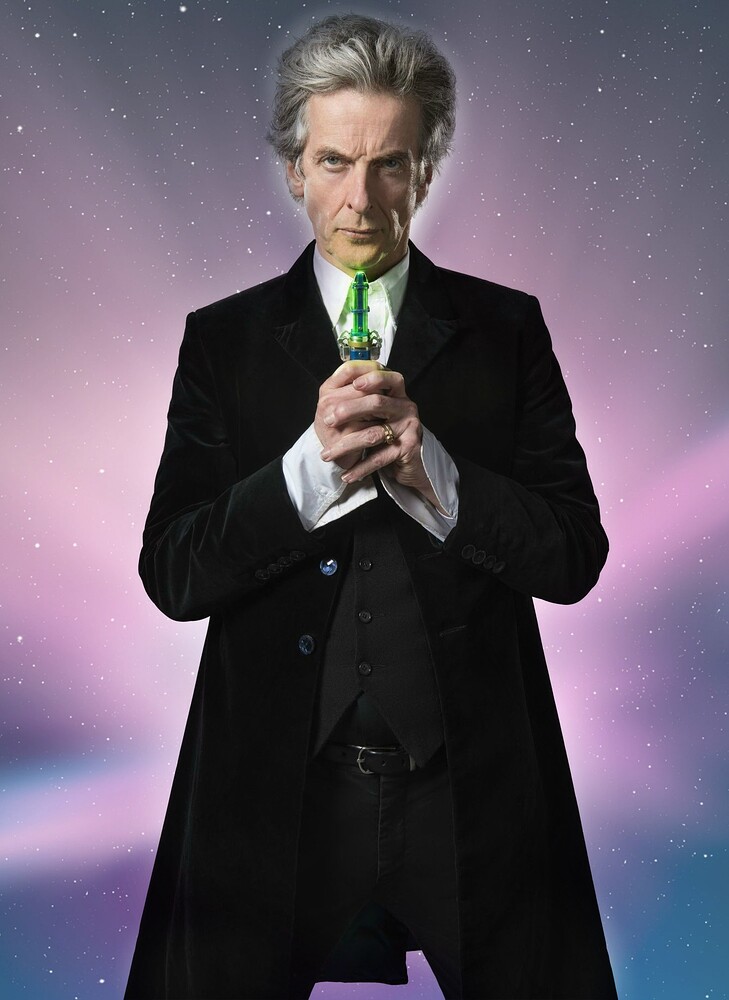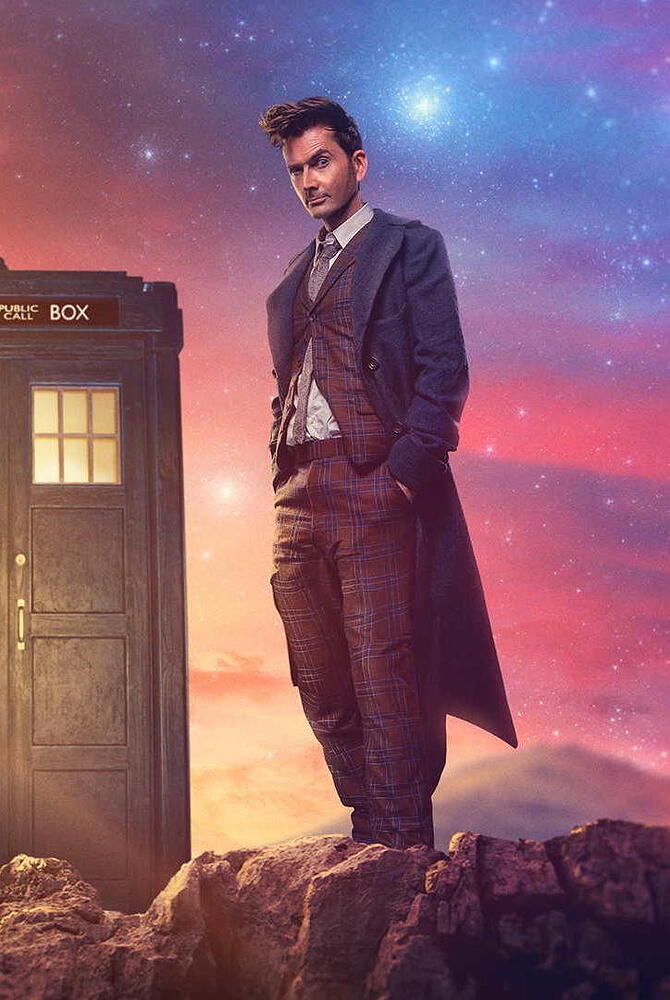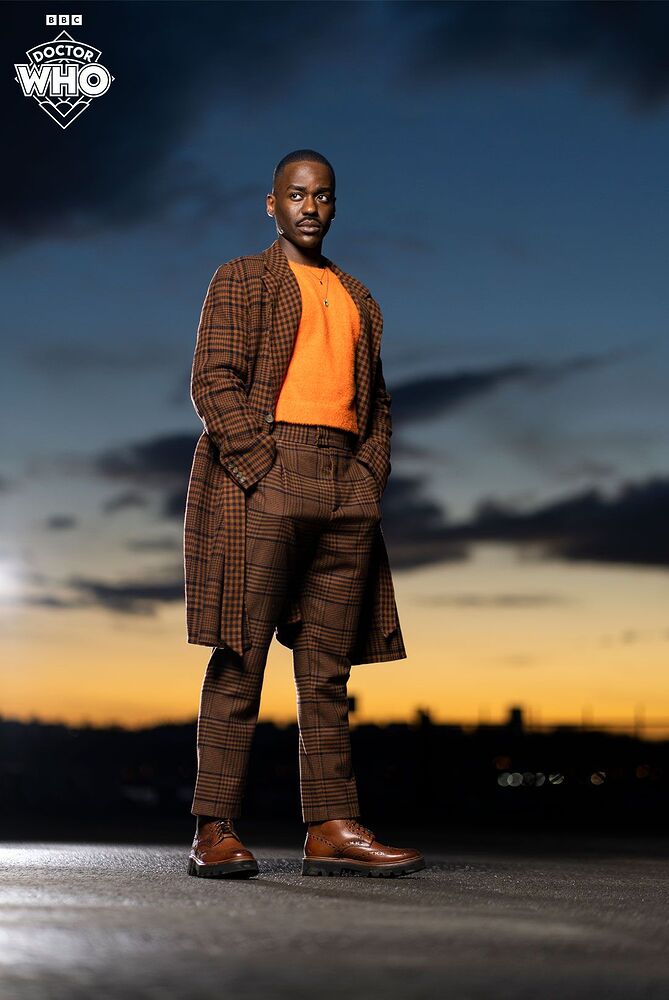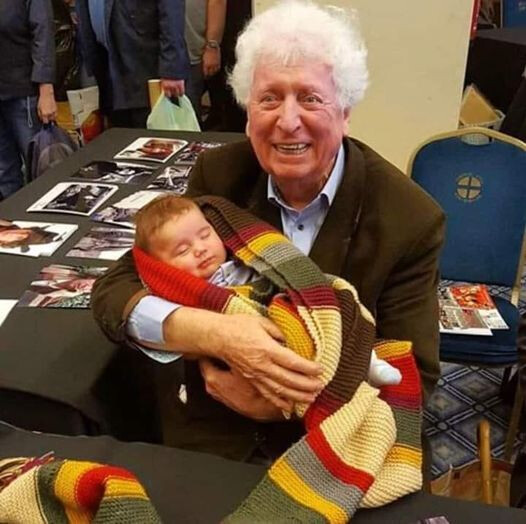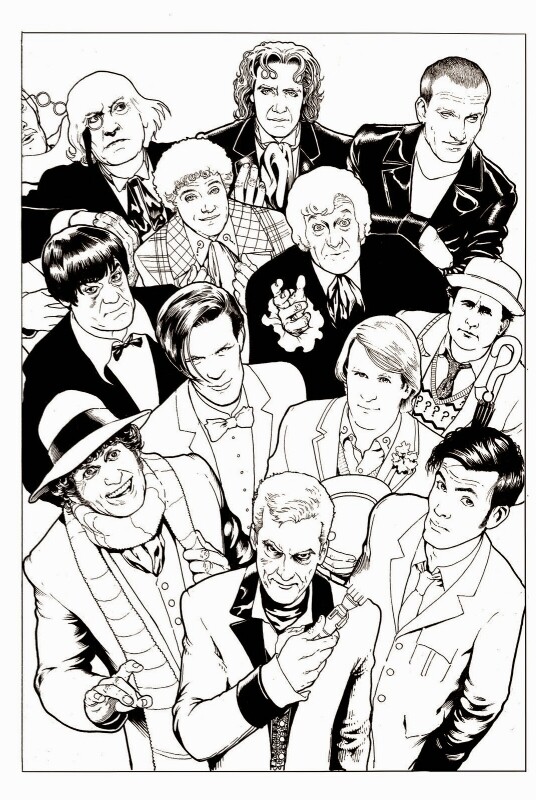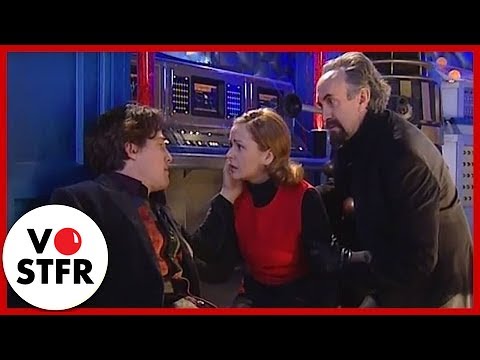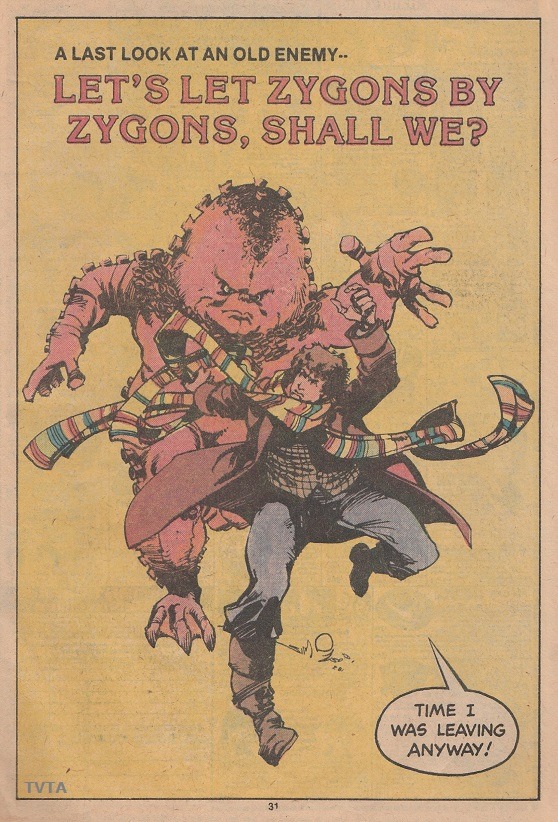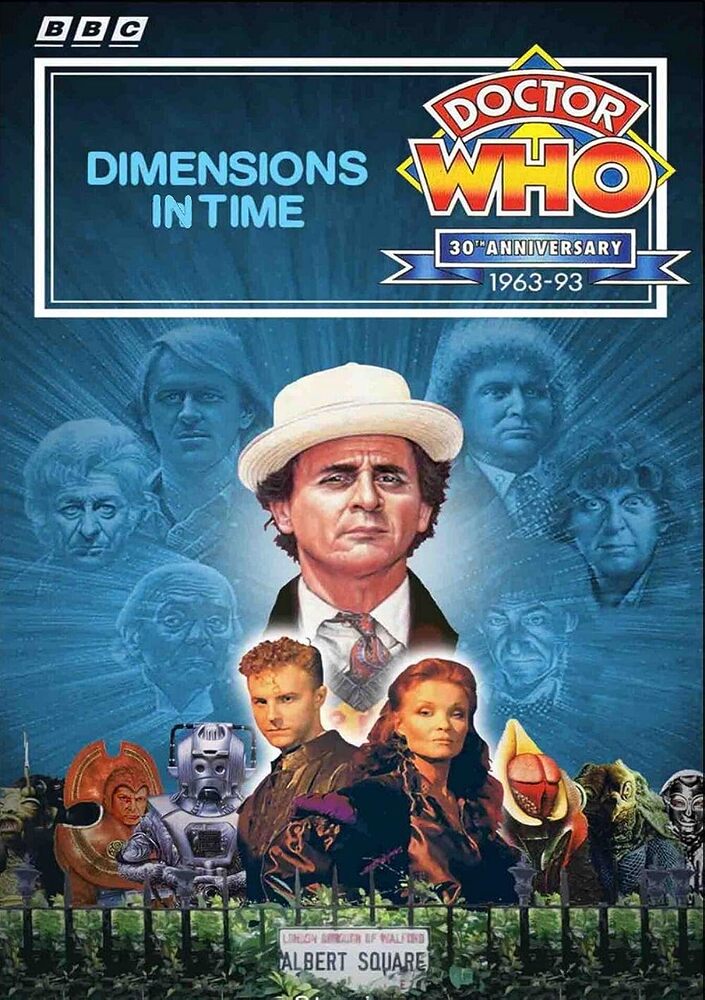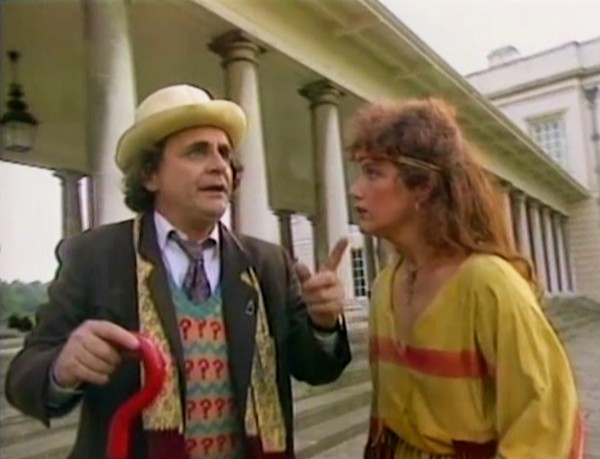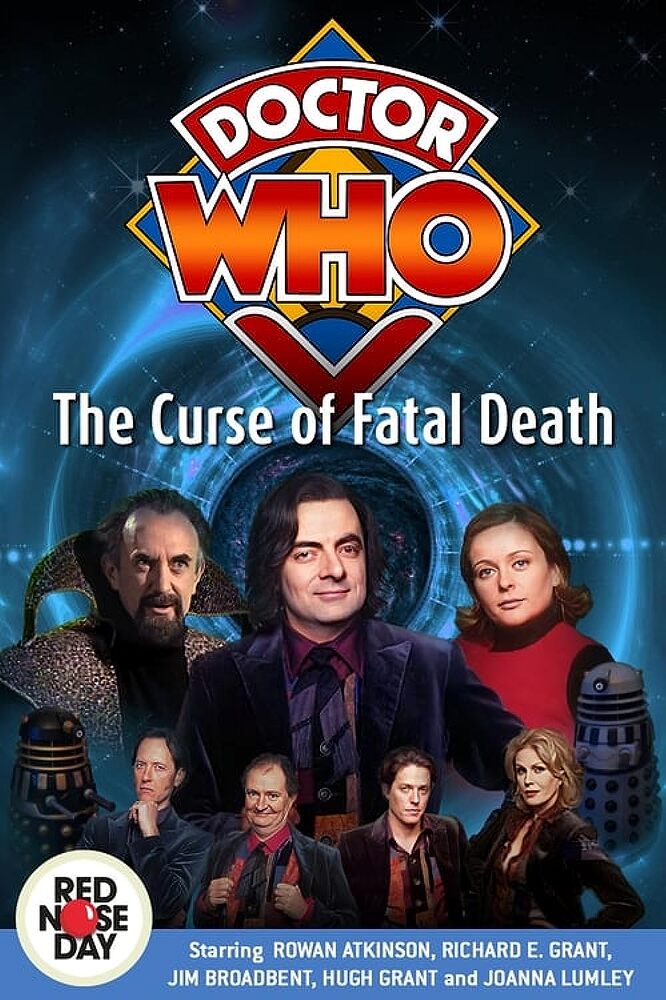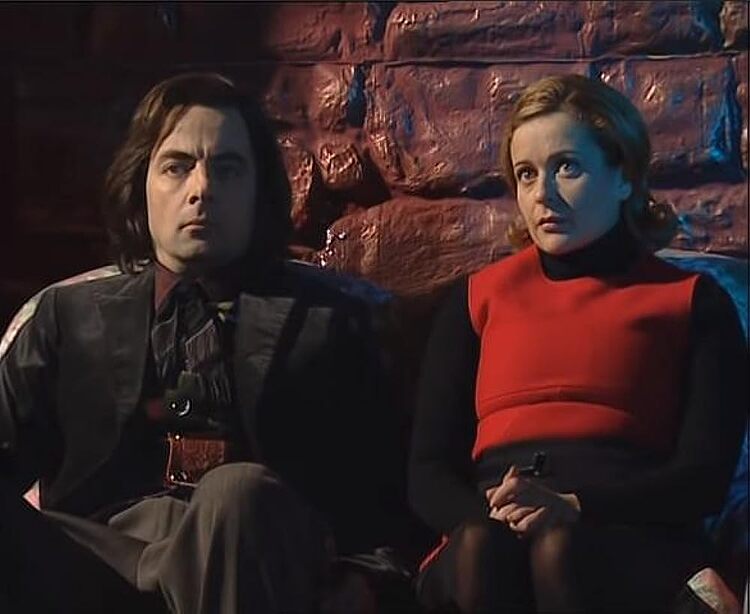Les 16 Docteurs principaux (avec des extraits tirés de TV Tropes et des visuels d’andy Lambert) :
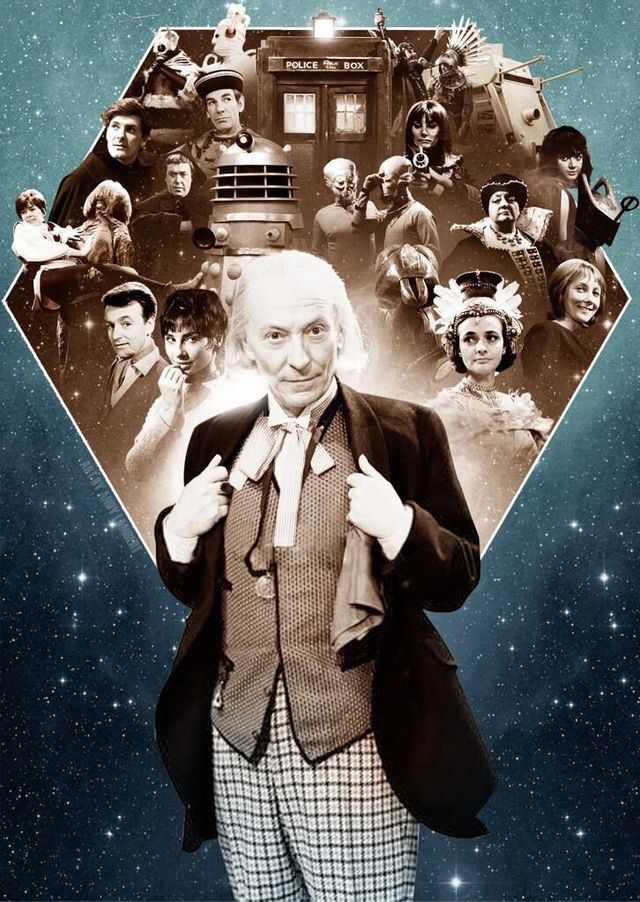
« Have you ever thought what it’s like to be wanderers in the Fourth Dimension? Have you? To be exiles? Susan and I are cut off from our own planet — without friends or protection. But one day we shall get back. Yes, one day. »
First appearance: « An Unearthly Child » (1963)
Regeneration story: « The Tenth Planet » (1966)
Played by: William Hartnell (1963–66, 1973); Richard Hurndall (1983); David Bradley (2017, 2022)
Voiced by: David Coker (1997); John Guilor (2013)
« One day, I shall come back. Yes, I shall come back. Until then, there must be no regrets, no tears, no anxieties. Just go forward in all your beliefs and prove to me that I am not mistaken in mine. »
The first known incarnation, the monocled, wild-eyed portent of doom. Introduced as a fugitive with an air of mystery about him, One was a merry misanthrope with a mischievous side, who loved manipulating people and playing games with their lives. His moral compass had long since deteriorated before leaving home, which raises the question of what could have possibly happened to him there, assuming it hadn’t been like that in the first place…
What we do know is that he and his granddaughter, who took the human name « Susan », left Gallifrey in a stolen TARDIS and eventually ended up on 20th Century Earth. Susan enrolled in a local school, but her, um, strange behaviour attracted the attention of two of her teachers — Ian Chesterton, her science teacher, and Barbara Wright, her history teacher — who discovered their secret. The Doctor kidnapped them and forced them along to make sure they kept their mouths shut.
However, Barbara and Ian had little patience for the arrogant, cowardly snob they found themselves sequestered with and gave him a much needed dressing down which made him realize the error of his ways — after their first three adventures together he became a much more patient, kinder, and altruistic figure, but also established that he was in charge of the TARDIS crew.
As he was never intended to be the « first » Doctor, simply the only Doctor, there is novelty in watching him developinto the Doctor as he’s known today.
After growing up to be an elderly man and grandfather, and meeting loads of new companions on his travels, the First Doctor developed many ailments and eventually began losing the fight to retain his health, which only got worse when the planet Mondas began draining energy from the Earth. When he became « weak as a kitten », his Time Lord biological clock set off a process to renew him. Scared of what he knew to be his first regeneration and the inevitable change to come, his path crossed with the Twelfth Doctor, who also needed to regenerate. After a look at past, present, and future, the Doctors parted ways and respectively regenerated. The First Doctor managed to get his current companions Ben and Polly inside the TARDIS as it went into flight, and the Doctor changed before their bewildered eyes into a whole new man…
Ironically, despite William Hartnell’s departure giving way to a trope decidedly meant to avoid The Other Darrin, the First Doctor has been the subject of it twice throughout the show — first by Richard Hurndall for « The Five Doctors »(as Hartnell died in 1975), and then David Bradley for « Twice Upon a Time » and « The Power of the Doctor » (as Hurndall died in 1984). Consequently, the First Doctor is the only one to be traditionally recast in the TV series (discounting Sylvester McCoy Fake Shemping for Colin Baker in « Time and the Rani »), though various soundalikes appeared in Big Finish’s audio dramas to play other Doctors whose original actors were either unavailable, uninterested, or dead. At 75, Bradley became the oldest actor to play the Doctor onscreen in 2017note , breaking the short-lived record of 73 year old Sir John Hurt in 2013, and he upped it to 80 when he reprised the role in 2022.
In 2017, Big Finish began a series of new First Doctor stories, with Bradley continuing in the role. In 2022, Stephen Noonan took up the role, with Noonan’s stories taking place later in First’s timeline.
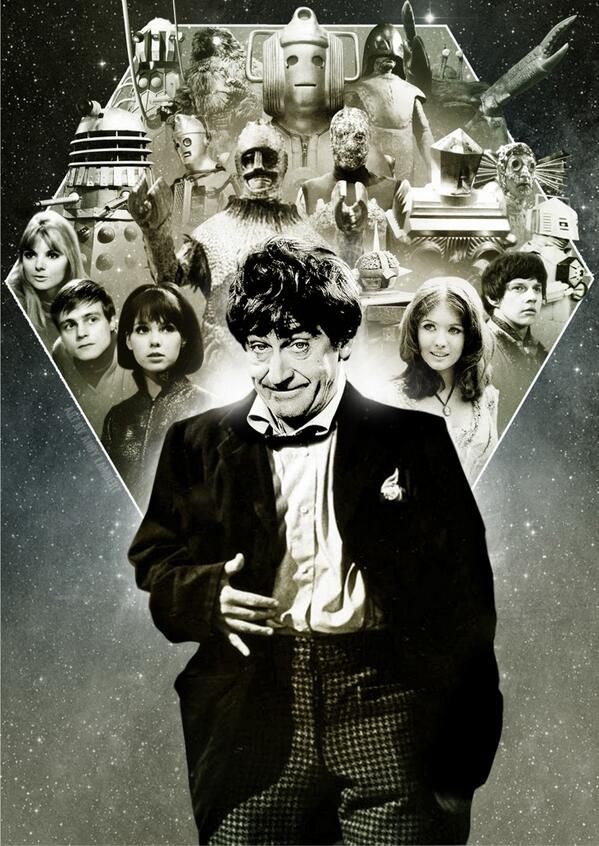
« Our lives are different to anybody else’s. That’s the exciting thing! There’s nobody in the universe who can do what we’re doing. »
First appearance: « The Tenth Planet » (1966)
Debut: « The Power of the Daleks » (1966)
Exit story: note « The War Games » (1969)
Regeneration comic strip note « The Night Walkers » (1969)
Played by: Patrick Troughton (1966–69, 1972–73,note 1983, 1985)
Voiced by: David Coker (1997); Chris Walker-Thomson (2020); Michael Troughton (2022)
« There are some corners of the universe which have bred the most terrible things. Things that act against everything we believe in. They must be fought! »
The cosmic hobo with the Beatles haircut. A more easy-going personality than his predecessor, though still very much an anti-authority maverick, the Second Doctor was a gadfly who enjoyed annoying everyone he met; he made an art form out of stealthily insulting his foes and allies alike.
Unlike his predecessor, who would often end up as a circumstantial hero by way of getting himself accidentally embroiled in dangerous situations and then having to find his way out of them again (though coming to embrace doing so anyway), the Second Doctor more actively felt he had somewhat of a moral obligation to help the oppressed and fight injustices wherever he came across them during his journeys.
He also had quite the knack for manipulation and deception; his favourite trick by far was pretending to be a bumbling and somewhat scatterbrained and naïve buffoon, generally acting clumsy and a little cowardly and asking seemingly perfectly innocent, but annoying questions, only to then catch his adversaries off-guard by revealing that a darker, more cunning and strong-willed personality lurked under this harmless surface.
The Second Doctor’s era ushered in the Monster of the Week premise and phased out the « pure » historical period stories where the only science fiction elements were the presence of the time travelling Doctor and his companions.
He liked to play the recorder (the musical instrument), and he carried a massive number of useful things in the pockets of his coat, including the now famous sonic screwdriver. (The Tenth Doctor would confirm that, as many fans had long suspected, the Doctor’s pockets are Bigger on the Inside in « The Runaway Bride »)
Unfortunately, the Doctor became embridled in a series of rapidly escalating conflicts orchestrated by the War Lords and their leader, a renegade from his own home planet known as the War Chief. Faced with a faction of evil time travelers on par with him, the situation proved much too big for the Doctor to eliminate and caused him to reluctantly call upon his own people, the Time Lords, to quash the mess.
However, he knew that he was placing himself in a defenceless position to be judged for causing disturbances in time and space. The final decision his superiors chose was to revert his companions back to their original places in history and swab away their memories of the Doctor, then exile the Doctor to Earth with a new appearance, but the Second Doctor did all he could to flee from a forced regeneration. In the end, however, he was unsuccessful and the Time Lords would eventually catch up to him…
« It seems that I am some kind of a galactic yo-yo! »
First appearance: « Spearhead from Space » (1970)
Regeneration story: « Planet of the Spiders » (1974)
Played by: Jon Pertwee (1970–74, 1983, 1989, 1993, 1995note , 1996)
Voiced by: Jon Culshaw (2020)
« Courage isn’t just a matter of not being frightened, you know. It’s being afraid and doing what you have to do anyway. »
The secret agent man, known for his Edwardian dress and fast cars (Bessie and the Whomobile!), half the time profane, and the other half profound. He spent a great many years trapped on Earth in the 20th Century with the TARDIS rendered inoperative, and often got into misadventures with his « friends » at UNIT, particularly The Brigadier.
The Third Doctor loved to be a showoff and was prone to magic tricks and all sorts of gadgetry, but that could also be his one downside as well. He sometimes got a little too caught up in his own devices, and if you caught him in one of his surlier moods, you’d encounter a highly abrasive man with a pointed tongue and a masculine pomposity just begging for him to be slapped — something his successors would learn the hard way when times changed and it became more acceptable for people to act out their frustrations.
A noticeably agile and more action-oriented Doctor, he wasn’t adverse to use more than his mind to subdue his enemies, and often resorted to Good Old Fisticuffs, being capable take on multiple opponents at once with his « Venusian Aikido ». When the Time Lords finally restored his memories of piloting the TARDIS, he became much more of a gentleman to his companions.
Due to the plot element of the Third Doctor’s Earth exile, he maintains the distinction of having an entire season, at least, in which he had absolutely no TARDIS travel and remained restricted to Earth. Also, being that his conception was inspired by the modern Action Hero/Super-Spy genre, the Third Doctor’s travels rarely, if ever, took him to historical eras. His era consisted of mostly contemporary UNIT-era stories or futuristic Space Opera.
The Third Doctor was one of the more preachy Doctors. Despite his obvious inspirations, he is more likely to deliver a Patrick Stewart Speech than a Bond One-Liner.
He revealed much of his Bizarre Alien Biology (notably the two hearts) and was the first Doctor to be broadcast in colour. As this Doctor’s tenure was largely confined to present-day London, he also inaugurated the grand old Doctor Who tradition of Everything Trying to Kill You. It was also this incarnation that formally introduced his greatest individual Arch-Enemy, The Master, with the Roger Delgado incarnation being present for many of Pertwee’s episodes.
He also dissected parts of the TARDIS while it was inoperable, and became intimately knowledgeable about how his ship worked, but couldn’t get it to behave. It turns out that all it needed was a new dematerialisation circuit to get it working again, which the Time Lords would gift him in gratitude for saving them from Omega. Thusly, he became a seasoned pilot at last, and eliminated most of the guesswork his previous incarnations needed to operate the TARDIS. He would go on several adventures throughout time and space like before, but still maintain close ties with UNIT. However, eventually he would be forced to regenerate into a new man after facing his fears on Metebelis III.
« I’m not a human being, I walk in eternity. »
First appearance: « Planet of the Spiders » (1974)
Debut: « Robot » (1974-1975)
Regeneration story: « Logopolis » (1981)
Played by: Tom Baker (1974–81, 1993, 2017note )
Voiced by: Tom Baker (1992–1993, 1997); Jon Culshaw (2020)
« You may be a doctor, but I’m the Doctor. The definite article, you might say. »
The idiot abroad, an aggravating cross between Sherlock Holmes and The Mad Hatter. Somewhat crazy-eyed, famous for a stupidly-long scarf, and very alien. In reaction to his long exile as the Third Doctor, the Fourth Doctor is defined by his strong wanderlust and a deep-seated resentment toward authority figures — particularly UNIT and his fellow Time Lords, resulting in him fleeing from whatever responsibilities they place on him. Naturally, this resulted in Four’s leash promptly getting yanked by every authority figure in the known universe, including the show’s embodiment of God; the White Guardian.
Highly eccentric, the Fourth Doctor delighted in keeping both friends and foes alike off-guard with oddball comments (including the occasional Stealth Insult) and pranks. But despite his generally goofy and cheeky attitude, he would occasionally have moments of intense brooding and seriousness, and could even be outright callous and intimidating at times (the result of Tom Baker, dealing with then-undiagnosed bipolar disorder, injecting himself into the character) — frequently emphasizing and affirming his distance from humanity. Nevertheless, he still displayed a strong moral code when the chips were down; firmly believing that the end never justified the means. His most famous quirks were offering people jellybabies and doing tricks with a yo-yo whenever he needed to relax or think (or test the gravity of a new planet).
His ultimate fate came at the hands of his old nemesis, the Master, who tilted the gantry of the Pharos Project antenna and made the Doctor fall several stories to the ground. He managed to disable the device to prevent the Master from using it to hold the universe at ransom under fear of the ability to destroy what was keeping it intact- after the Master already took out a large chunk of it. A strange entity that the Doctor’s newest companions named the Watcher lurked about, which this Doctor took as a sign of his impending demise. Fortunately, the Watcher was a kind being that actually existed as a figment of his future self, and united with him to facilitate his regeneration.
The longest-serving Doctor to date in real-world time, both by years and season count (seven each), and probably the best known of all his incarnations. If you don’t know who Tom Baker is, close your eyes and think of Doctor Who. That’s him. (or possibly David Tennant for newer fans — see the Tenth Doctor page.)
« For some people, small, beautiful events are what life is all about! »
First appearance: « Logopolis » (1981)
Debut: « Castrovalva » (1982)
Regeneration story: « The Caves of Androzani » (1984)
Played by: Peter Davison (1981–84, 1993, 2007, 2018, 2022)
Voiced by: Peter Davison (1997); Jon Culshaw (2020)
« Oh, marvellous. You’re going to kill me. What a finely tuned response to the situation. »
The put-upon Edwardian cricketer. Blessed with a « pleasant open face », the Fifth Doctor lived his life according to the British tradition of fair play. A borderline Glurge Addict, determined to make the best of bad situations, his episodes gained the air of a field trip gone horrifically wrong, his stories tending to have high body counts.
This Doctor was more human than his previous incarnation and behaved a bit like an older brother towards his companions — or perhaps an exasperated Team Dad whenever things would inevitably go haywire. At the same time, he also had stronger shades of an Absent-Minded Professor than usual; being highly curious and eager to learn and explore, but also prone to being easily distracted or getting caught up in his own thoughts and musings, sometimes to the point where he got himself and others into trouble simply by not paying enough attention. While the Doctor was no stranger to running afoul of local authorities — either due to misunderstandings or the local authorities being of the oppressive type — and getting arrested and imprisoned as a result, it happened so often to Five that it became something of a Running Gag for his era, which the Extended Universe would later lampshade mercilessly.
His era was notable for Doctor Who becoming more of an ensemble show, with up to three companions travelling with him at once, something that really wouldn’t be seriously attempted again until the Thirteenth Doctor’s era. It was also during Five’s tenure that the Sonic Screwdriver was destroyed by one of his foes (John Nathan-Turner felt that the show’s writers would too often fall back on it as a Deus ex Machina), making the Doctor a more « hands free » character, something that would last until the TV Movierevealed that the Seventh Doctor had built or acquired a new one at some point.
After a trip to Androzani Minor resulted in him and his newest companion Peri touching unrefined spectrox, they developed spectrox toxaemia and had to seek a cure before the poison killed them. They were caught in the middle of a cabal of greed, murder, lust, and the worst luck ever. Fortunately, the Doctor learnt the sickness could be cured, but only managed to save Peri when his body lost the strength to stand and he lost half of the antidote in the dirt. Shortly after his Heroic Sacrifice, the Fifth Doctor underwent a very delirious regeneration while envisioning his latest companions as well as the Master, transforming into a harsher man.
Though young when he was first cast (29, the youngest Doctor ever until Matt Smith), Davison was already a well-known actor, having played in All Creatures Great And Small. He was the first classic Doctor to show up in the new series. His eventual son-in-law David Tennant cited him as his inspiration for playing the Doctor.
« Planets come and go. Stars perish. Matter disperses, coalesces, forms into other patterns, other worlds. Nothing can be eternal. »
First appearence: « The Caves of Androzani » (1984)
Debut: « The Twin Dilemma » (1984)
Final story: note « The Trial of a Time Lord: The Ultimate Foe » (1986)
Regeneration television story: "Time and the Rani"note (1987)
Regeneration audio story: "The Sixth Doctor: The Last Adventure – The Brink of Death"note (2015)
Played by: Colin Baker (1984–86, 1989, 1993, 2022); Sylvester McCoynote (1987)
Voiced by: Colin Baker (1985, 1997); Angus Villiers-Stuart (2020)
« In all my travelling throughout the universe, I have battled against evil, against power-mad conspirators. I should have stayed here. The oldest civilisation: decadent, degenerate, and rotten to the core. Power-mad conspirators, Daleks, Sontarans, Cybermen — they’re still in the nursery compared to us. Ten million years of absolute power. That’s what it takes to be really corrupt. »
The prideful, verbose naysayer with a Hidden Heart of Gold and the dress sense of a BBC test card. The Sixth Doctor was a darker and certainly more unstable Doctor, more suited for a hard and chaotic universe than his previous self, and his default emotions were righteous indignation or smug self-satisfaction. He wore a multicoloured coat (which to this day is quite possibly the most visually distinctive outfit the Doctor has worn, for better or for worse - perhaps it was a midlife crisis?) and wasn’t averse to fisticuffs or murder to get out of a desperate fix.
Despite his thunderous exterior and tendency towards Dirty Business, he still remained firmly dedicated to the pursuit of justice, and was always capable of being deadly serious or emphatic to others’ plight when the situation called for it, and when the chips were down, he always remained unwavering and uncompromising when confronting the local forces of evil or the morally misguided, unafraid to give them a sharp and passionate « The Reason You Suck » Speech or Kirk Summation, no matter how great a threat they posed to him; occasionally, he’d dare them to actually go through with shooting him while unleashing a dictionary of Sesquipedalian Loquaciousness at them.
Alas, viewers weren’t exactly fond of the idea of an overtly morally grey Doctor, especially when his first story featured him strangling the living daylights out of his companion unprovoked. During his first season, the show got in trouble for being too violent, and after a double-length hiatus and an even rockier second season, Baker became the only actor to be outright fired from the role, thanks to Executive Meddling. The fallout was so acrimonious that he didn’t reprise the role for a regeneration (he asked for a full season, but the BBC wouldn’t budge past a single story, arguing that the 18-month hiatus somehow contractually counted as a season), so they Dropped a Bridge on Him. However, Colin Baker is actually a wonderful guy and has always been an ardent fan of the show even after the hell he went through while playing the Doctor; he is currently still redeeming the character fantastically in Big Finish Doctor Who, to the point of being voted « favourite audio Doctor » by the fans, and eventually did his Doctor justice with a proper regeneration story in 2015.
As the years went by, the Sixth Doctor had many companions, who helped sand down the prickly attitude and the ego to match. He stood atop his soapbox only when he needed it and boasted when it was appropriate. Especially prominent in his audio adventures, Six had lots of Character Development that turned the pompous braggart into a friendly, cultured chap with zest and charm.
However, while he was becoming a better person, he encountered his antithesis, the Valeyard, who tried many times to seize everything the Doctor had for himself, until a day came when one of his overarching plans succeeded. Six, trapped in the Matrix with no escape and the company of a triumphant Valeyard, decided to cut his own life short and steer his younger self toward Lakertya, despite a warning that something was producing deadly radiation nearby. His TARDIS came under attack by the Rani as she pelted it with beams from a radiation gun, which didn’t hurt humans but was lethal to Time Lords. Six got a glimpse of his next self as he regenerated, and the version of him in the Matrix faded away, leaving the Valeyard robbed of victory and trapped inside.
« Time will tell. It always does. »
Debut: « Time and the Rani » (1987)
Final story: « Survival » (1989)note
Regeneration story: « Doctor Who: The Movie » (1996)
Played by: Sylvester McCoy (1987–89, 1990, 1993, 1996, 2021, 2022)
Voiced by: Sylvester McCoy (1997); Wink Taylor (2020)
« Every great decision creates ripples, like a huge boulder dropped in a lake. The ripples merge and rebound off the banks in unforeseeable ways. The heavier the decision, the larger the waves, the more uncertain the consequences. »
The killer comedian, clad in Jay Gatsby summer wear from The Roaring '20s. This Doctor began as a sort of bumbling goof, but this wacky surface would increasingly be shown to be an Obfuscating Stupidity act, as he became a more manipulative and enigmatic figure, frequently proving himself to be quite The Chessmaster, when the show got a little darker in its final two seasons.
Seven was even more passionate about justice than his predecessors, but was also much more shrewd and cunning in his pursuit of it. He was fond of The Plan and despatching his enemies through Batman Gambits that tricked them into getting Hoist by Their Own Petard, and a bit of a Knight Templar Parentto his companion Ace. He also proved to be one of the least scatter-brained incarnations of the Doctor, almost always having some sort of crucial insight into the situations he found himself in, although he was also good at keeping his cards close to his chest and not letting on how much he knew until he felt the time was right. These qualities came even more to the fore in the many, many Expanded Universe Doctor Who New Adventures novels he starred in. Hinted at numerous times to be much more than a « mere » Time Lord — a Story Arc which didn’t quite pan out as such. What little made it into the show, however, added a few clues regarding his escape from Gallifrey, which appears to have included nicking the Hand of Omega as he went. He also played the spoons as a musical instrument.
While still continuing his long-lasting fight against evil, sometimes Seven would cross the line between noble and coldhearted, since his predecessor’s dying act was to let go of his moral scruples for the greater good. Unfortunately, he hurt some of his closest friends by toying with their minds as part of his schemes. Though he always offered an apology, he would not always receive forgivenes.
As Seven grew older, he became weary of the mental toll that manipulating others caused, and the misdeeds he had done. He retired from plotting, started travelling alone, and turned the TARDIS into an elegant study. One day, he was tasked with bringing the Master’s remains post-execution on Skaro to Gallifrey, but his nemesis broke free and escaped. Unfortunately, Seven had a lapse in judgement by not checking the TARDIS scanner before exiting it and walked out into the fray of a gang war in San Francisco. At a local hospital, surgeons removed the bullets but screwed up with the Time Lord’s unique biology, inadvertently killing him, and nearly for good. However, after several hours he would regenerate in the morgue, becoming a less manipulative and more romantic man.
Because Sylvester McCoy is a darling of a man, his Doctor has a tendency for showing up in unlicensed productions, such as Rob Shearman’s BBV audioplay Punchline or Doctor Who: The Movie.
« I love humans. Always seeing patterns in things that aren’t there. »
Debut: « Doctor Who: The Movie » (1996)
Regeneration story: « The Night of the Doctor » (2013)
Played by: Paul McGann (1996, 2013, 2022)
Voiced by: Angus Villiers-Stuart (2020)
« The universe hangs by such a delicate thread of coincidences — it’s useless to meddle with it unless, like me, you’re a Time Lord. »
The bouncy, charming, optimistic romantic, slowly darkened by the Last Great Time War into a rugged Warrior Poet from lossand sorrow. A man who wanted the universe to be peaceful and beautiful, only to be met with disaster and doom that ruined his expectations. From the little we saw of him, the Eighth Doctor was a chatty, passionate figure who revelled in life and living and — uniquely among the Doctors — seemed to enjoy giving people hints about their futures.
Notably, he was the Doctor who shattered the No Hugging, No Kissing policy forever, happily snogging his companions just because he wanted to. He also claimed to be half-human, which was either ignored or denied by fans and in later stories. Alas, TV audiences only knew him for a single night, owing to neither BBC nor Fox being interested in turning the TV movie into a full revival of the series despite it doing quite well in the franchise’s native UK (Fox lost interest because the film flopped in America — for whom it was directed — though for whatever reason its British success didn’t faze the BBC).
He got fleshed out considerably in the Expanded Universemedia, including the Eighth Doctor Adventures novels, the Doctor Who Magazine comics and the Big Finish audio series, and continues to be, before finally coming Back for the Dead in the TV series for a prelude to the 50th anniversary special. Despite his scant three appearances on screen, he has one of the, if not the biggest resume of stories out of all the Doctors, when books, comics and audio adventures are factored in.
In contrast to the somewhat clownish, yet manipulative and secretive Seventh Doctor, Eight was defined by his kind, optimistic and classy personality, and he took on many companions. Unfortunately, he was subjected to some of the meanest and nastiest circumstances, constantly captured and tortured, witness to many senseless deaths, and saddled with amnesia so many times that it is a wonder he didn’t go insane.
In the later years of his life, he had turned colder and angrier and less willing to take on companions because it was becoming clear that something terrible in the universe had been brewing. Finally, the Daleks and Time Lords were locked into a terrible and enormous war, which the Doctor tried to avoid like the plague. However, he was often forced into involvement, but tried to keep his distance from the centre of the battle. When he offered safety to a gunship crewmember in an act of goodwill and got rebuked, Eight went down with the ship and awoke to the unavoidable truth that he must enter the Time War or the universe would soon be gone. Caving to despair and rage, he allowed himself to become a warrior and gave up on being the Doctor.
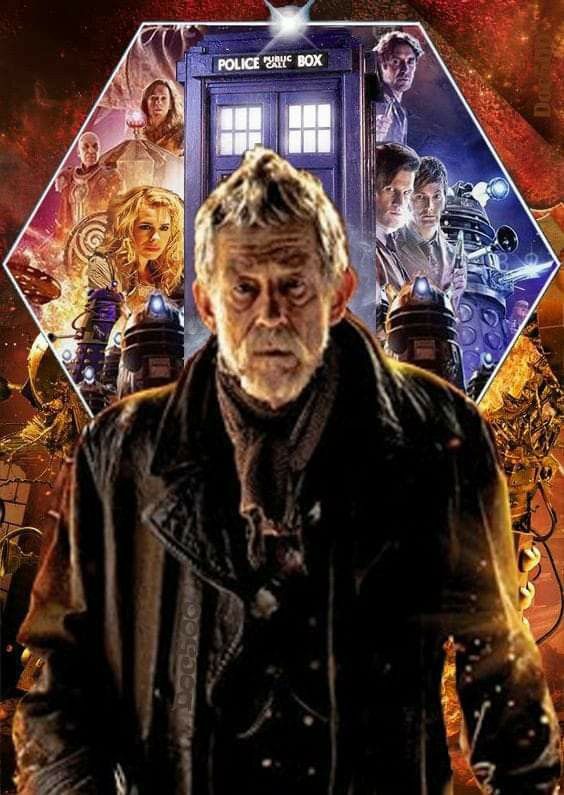
« What I did, I did without choice. In the name of peace and sanity. »
First appearance: « The Name of the Doctor » (2013)
Debut: « The Night of the Doctor » (2013)
Regeneration story: « The Day of the Doctor » (2013)
Played by: Sir John Hurt (2013); Paul McGannnote (2013)
Voiced by: Jonathon Carley (2020)
« Great men are forged in fire. It is the privilege of lesser men to light the flame. Whatever the cost. »
The world-weary and at times anachronistic knight — the Doctor’s greatest secret. The War Doctor was a « lost » incarnation of the Doctor who existed between his Eighth and Ninth previously known incarnations. He was the incarnation who fought in the Last Great Time War, and lost his right to be called « the Doctor » for it, choosing to assume the identity of a warrior. He renounced the promises behind his name and spent an enormous period of his life in battle, doing the exact opposite of a healer’s work. He evidently knew how to survive the war quite well, since he aged to the point he went from a young, fiery warrior, to an exhausted and curmudgeonly old man, complete with a scruffy beard.
As the war waged, it became apparent that the Time Lords had become a threat to the universe just the same as the Daleks, forcing the Doctor into making a Sadistic Choice to save reality at the cost of his own people. However, a chance encounter with two of his future selves showed him another way to end the conflict without destroying his home planet. After wearing himself out to the absolute limit of his lifespan, the War Doctor underwent a peaceful and contented regeneration, enjoying the brief time he knew that Gallifrey was saved before it slipped away from his memories. Later incarnations of the Doctor gained respect from other Time War survivors, and were influenced to follow his example of peaceful temperament, because they knew the Doctor could be a savage punisher when angered.
His tenure is, bar none, the darkest chapter of the Doctor’s entire life. On top of that, his introduction to the story was a cover-all solution to a problem writers faced that kept them from chronicling the Time War beyond a surface probing of its enormity, because no writer would dare touch the subject due to not knowing which incarnation was the one who dutifully lived out the war to the bitter end, and not wanting to risk contradicting each others’ narratives. This is where the War Doctor came into play, as a surprise addition to the family.
The biggest issue stalling progress in the Time War canon was that no one outside the TV series received the final authority to confirm if it was the Eighth or Ninth Doctor or a combination of the two who participated in the Time War, only compounded with the lack of a filmed connecting regeneration sequence to sort everything out and finish the bridge from the classic era to the revival era. The general conclusion was that both of those Doctors had seen so much Character Development and behaved so enthusiastically (Eight)/reinvigorated (Nine) that writers were incapable of seeing either Doctor fit the intensely gritty and hope-starved characterization the Time War called for. Despite the Eighth Doctor’s turn towards a darker character as heard in the Big Finish audios, he remained a conscientious objector until the war became unavoidable, and the only feasible outcome was that he had to abandon his whole identity to steel himself for combat and become someone else with the capacity to defy his own taboos.
Likewise, the Ninth Doctor had the inklings of a man seeking a fresh start and recoiled when faced with the loose ends of the Time War, behaving as the Doctor, though with some figments of the war combatant mentality crammed away and exposed when he was provoked. This left even the most articulate minds scratching their heads and speculating until they were blue in the face. Every time they tried to resolve things with their take of an answer, they’d end up unconvincing themselves it would work, so the issue floated unanswered in narrative limbo for an insufferably long time.
After eight years of narrative stalemate in the revival era series, the time finally was right to address the problem, with the prestigious fiftieth anniversary of the show practically begging for the Time War to be at its central focus. Unfortunately, Christopher Eccleston chose not to return, and then-showrunner Steven Moffat claimed to have a hard time believing the Eighth Doctor had been the one who ended the Time War. The Doctor’s existence as we knew it had been linear, but Moffat hatched a revolutionary plan: retroactively create an incarnation played by a very famous celebrity (an honor presented to a very enthusiastic John Hurt) and incorporate them into the missing link between Doctors Eight and Nine, invalidating both as possibilities for direct involvement in the Time War, create the retcontwist of the War Doctor as the true battler of the Time War and go in with a blank slate, and bring Paul McGann back for the regeneration. When the War Doctor was conceived, it solidified the issue at hand and opened the gates to the uncharted wilderness that is the Time War itself. However, factoring in both the War Doctor and the Meta-Crisis Tenth Doctor from Journey’s End, it meant the Doctor’s regeneration cycle limit would have to be handled much sooner… fix one leak, and another one springs. Even so, this creates even more opportunities to plan creative plot twists.
While he regains his title at the end of « The Day of the Doctor », the War Doctor still doesn’t count in the Doctor incarnation numbering as he was never an « incumbent » Doctor, but added retroactively. And thus the War Doctor hails from a time before the 2005 reboot, even if his story was told eight years later… and for good reason. The Doctor didn’t want to bring him up.
His actor, Sir John Hurt, who became the first of the Doctors to be knighted, continued portraying the role of the War Doctor in a 12-episode line of audio stories that were clearly working toward the last act of the War Doctor’s life. Sadly, he suffered a bout of recurrent pancreatic cancer that lasted for about two years and finally led to his passing right after his 77th birthday in 2017, leaving future plans for his Doctor in the air outside of printed works. Fortunately, this changed once a soundalike stepped into the role during a webcast special in 2020 called Lockdown, Jonathon Carley. He was one of many voice actors impersonating every Doctor up to Thirteen to release a short but positive story during the COVID-19 pandemic.
In 2020, Big Finish announced they’d cast Carley as a younger War Doctor, fresh off his regeneration, for a new 12-part series of audio stories, intended to explore the early stages of his role in the Time War.
« I’m a Time Lord. I’m the last of the Time Lords. They’re all gone. I’m the only survivor. I’m left travelling on my own, 'cos there’s no one else. »
First appearance: « Rose » (2005)
Regeneration story: « The Parting of the Ways » (2005)
Played by: Christopher Eccleston (2005)
Voiced by: Pete Walsh (2020)
« Do you know like we were sayin’? About the Earth revolving? It’s like when you’re a kid. The first time they tell you that the world’s turning and you just can’t quite believe it ‹ cos everything looks like it’s standin › still. I can feel it. The turn of the Earth. The ground beneath our feet is spinnin’ at 1,000 miles an hour and the entire planet is hurtling around the sun at 67,000 miles an hour, and I can feel it. We’re fallin’ through space, you and me, clinging to the skin of this tiny little world, and if we let go… That’s who I am. »
The brooding, but very sassy veteran and the sole remainingTime Lord in the universe after the Last Great Time War. Riddled with Survivor Guilt from his memories of the Time War, the Ninth Doctor was dark, cynical, and moody at times, and his eagerness to take on « tourists » was diminished. His short temper made it harder to relate to people, and he reacted like a scorched cat whenever they let him down, yet all of it masked great affection and empathy for others, and that he was a (reluctant) optimist at his core. Prone to mood swings, switching between a likable clown and Jerkass within the breadth of the same conversation. Perhaps reflecting his less carefree mindset, Nine is the most normally dressed incarnation of the Doctor, with close-cropped hair, a wristwatch, Timberlands, and beat-up leather jacket befitting a much more street-smart Doctor than previous or later versions, one who notes he doesn’t « do domestic ». As time went on, however, his desire to travel with others would be reignited after meeting a young woman named Rose Tyler, which benefitted greatly to his healing process. After coming face to face with his oldest enemies, the Daleks, and almost being forced into the same Sadistic Choice he was at the end of the Time War, he preformed a Heroic Sacrifice the Fifth would be proud of when he saved Rose at the cost of his own life. Despite his pain and anger, Nine died at peace as a generally fantastic Doctor, transforming into a more energetic figure to reflect his Character Development.
In terms of television, Nine has had the shortest regular tenure out of all the Doctors, with just 13 episodes broadcast in a single season. The only others shorter than his are the Eighth Doctor’s three onscreen appearances, and the War Doctor’s three, the latter of which (plus Eight’s second) were all contained within the Eleventh Doctor’s era. Counting Paul McGann and John Hurt’s work as the Doctor for Big Finish, Eccleston officially becomes the shortest-tenured actor in the role, dropping behind John Hurt’s combined fifteen episodes. It is also probable that in the Doctor’s own timeline, the Ninth is also chronologically the shortest lived in terms of time spent between regenerations. The fast, almost realtime pace of the Ninth Doctor’s only season and the constant presence of companions left very little room for extended off-screen activities between episodes. Word of God has stated that at the beginning of the series, the Ninth was still fairly new (to stress that he wasn’t the one who fought in the Time War), especially since he was just finding out what he looked like.note Also, the Ninth was the least touched upon Doctor in expanded media for a long time, though luckily Titan Comics and Big Finish are breathing new life into the Ninth Doctor’s adventures.
Despite Christopher Eccleston having been reluctant to reprise the role for many years, in a surprise announcement in 2020, Big Finish revealed that they finally managed to get him to do so. Eccleston thus began a whole new era as Nine, the first batch of which was released in May 2021. He is also set to appear in Big Finish’s 60 Year Anniversary special, meaning that a multi-Doctor story featuring Eccleston as Nine is finally going to happen, though perhaps not in the medium most people expected.
« I’m the Doctor. I’m a Time Lord. I’m from the planet Gallifrey in the Constellation of Kasterborous. I’m 903 years old and I’m the man who is gonna save your lives and all 6 billion people on the planet below. You got a problem with that? »
First appearance: « The Parting of the Ways » (2005)
Debut: « The Christmas Invasion » (2005)
Regeneration story: « The End of Time » (2009-2010)
Played by: David Tennant (2005–2010, 2013, 2018)
Voiced by: David Tennant (2006, 2009, 2016, 2020); Elliott Crossley(2020-2021)
« I’m old enough to know that a longer life isn’t always a better one. In the end, you just get tired; tired of the struggle, tired of losing everyone that matters to you, tired of watching everything you love turn to dust. If you live long enough, Lazarus, the only certainty left is that you’ll end up alone. »
The scruffy, witty, and somewhat Mulder-ish heartthrob, with great inner fury and wistful melancholy concealed under his easygoing attitude. An accidental and often reluctant Chick Magnet, the Tenth Doctor started out rather manic: prone to speaking very quickly, peppering his speech with pop culture references and foreign words, and going off on long rambling tangents.
Despite his bubbly personality, he didn’t hesitate to lay down the law, much like his predecessor did (later Doctors would behave much more diplomatically); he invariably subjected his foes to a Fate Worse than Death if they passed up the one chance at redemption he always offered, and in some cases he would end up acting as Judge, Jury, and Executioner (self-appointed, mind you, by virtue of being the last of the Time Lords) in the heat of the moment, to the point where his own capacity for ruthless actions in the name of the greater good would occasionally leave him scared and him questioning his own morality afterwards.
He despised his past selves for their role in the Last Great Time War, and was always at his coldest when confronted with it. He held deep respect for pacifism, and remembered how nice Gallifrey used to be, and how much he hated the corruption of Time Lord society into warmongers. He had zero tolerance towards anyone who wanted to engage in violence to resolve conflicts and disapproved of guns unless they were unquestionably a last resort. A long-standing fault of this Doctor was his vanity and his attachment to his current self, with him even finding a way to regenerate while keeping the same face following a lucky shot from a Dalek. When warned about his upcoming demise from a psychic, he tried to avoid it as much as possible, and considered even the prospect of regeneration to be akin to death.
Alas, at the end of his life, the Doctor would be forced to deal with his trauma from the Time War when his Arch-Enemy, the Master, opened a gateway to the final day of the conflict. Even though he managed to survive this encounter and save the day, he would reluctantly sacrifice himself to save his friend Wilfred Mott, pushing aside his ego and fear of change to do so. After visiting all of his companions once more, the Tenth Doctor would undergo a true regeneration, letting go of this life to become a madman with a box. However, many centuries later, the Thirteenth Doctor would end up regenerating into a form almost identical to this old face…
As mentioned on the Fourth Doctor’s page, Ten is widely regarded as one of the most iconic portrayals of the Doctor, thanks in no small part due to his much more human and empathetic, yet still frighteningly alien personality depicted during his tenure.
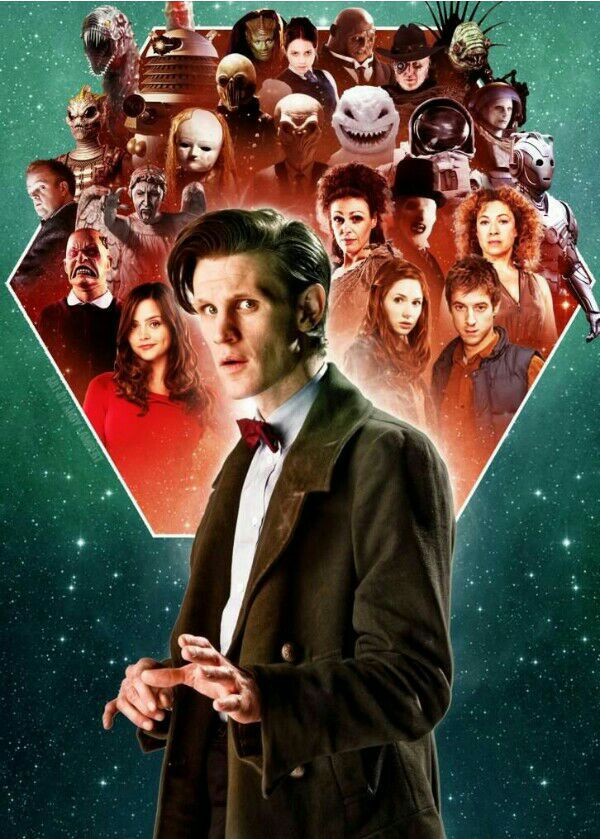
« There’s something you better understand about me, 'cause it’s important and one day your life may depend on it. I am definitely a madman with a box! »
First appearance: « The End of Time » (2010)
Debut: « The Eleventh Hour » (2010)
Regeneration story: « The Time of the Doctor » (2013)
Played by: Matt Smith (2010–2013, 2014)
Voiced by: Matt Smith (2010–2011, 2012); Jacob Dudman (2020)
« The way I see it, every life is a pile of good things and bad things. The good things don’t always soften the bad things, but vice versa the bad things don’t always spoil the good things or make them unimportant. »
The thirteenth and final incarnation in the Doctor’s first regeneration cycle.note
The outlandish hipster who stepped out of a fairy tale, able to solve all sorts of problems with a wave of his Magic Wand. He was particularly drawn to mystery-solving as well as a Friend to All Children who loved joining in on their fun. Had a distinct air of an old professor in a young man’s body, trying in vain to blend in with his younger, more sociable companions. Frequently tripping over his own tangled thoughts, words, and limbs, Eleven was definitely very alien.
A large chunk of his life was governed by uncovering various mysteries, several of which centered around a cult known as the Silence. He spent a long time trying to keep the universe intact, being thrust deep into a conspiracy to put an end to him, and having many encounters with River Song, learning the story behind her existence.
He was also incredibly burdened by loss and took it with profound mourning, followed by seclusion and bitterness, to the point he retired from heroics and traveling after losing longtime friends Amy Pond and Rory Williams. It was only through confronting the worst moment of his life once again, the Last Great Time War, that allowed him to truly move forward and be the Doctor, fighting his greatest enemies on a final battlefield for almost a millennium. Having ran out of regenerations, the Doctor was surprised to receive a new regeneration cycle and escaped a final death by the Daleks. After being reset to his younger form and bidding one final farewell to this body, he regenerated into an older man with sharp eyebrows and a sharper wit.
He is often considered the most childlike Doctor, hopping and skipping all over the place regardless of the seriousness of the situation. Like his predecessor, however, scratch the surface and you would find a secretive old man who was very liable to snap into Tranquil Fury mode if you hurt him, willing to resort to violence and manipulation if necessary.
To date, Matt Smith is the youngest actor to be cast as the Doctor, as he was only twenty-six when cast, he was three years younger than the previous record-holder, Peter Davison, who played the Fifth Doctor.
« Sometimes the only choices you have are bad ones, but you still have to choose. »
First appearance: « The Day of the Doctor » (2013)note
Debut: « Deep Breath » (2014)
Regeneration Story: « Twice Upon A Time » (2017)
Played by: Peter Capaldi (2013–2017)
Voiced by: Peter Capaldi (2014–2015); Jacob Dudman (2020); Jonathon Carley (2020)
"Winning? Is that what you think it’s about? I’m not trying to win. I’m not doing this because I want to beat someone, or 'cause I hate someone, or because— because I wanna blame someone! It’s not because it’s fun. God knows it’s not because it’s easy. It’s not even because it works, because it hardly ever does. I do what I do because it’s right! Because it’s decent! And above all, it’s kind! It’s just that. Just kind."
The first incarnation in the Doctor’s second regeneration cycle.
An acerbic, aging, Absent-Minded Professor with a dash of street magician, and he’s also a Punk Rocker who kills it with a guitar. Although still lovably dorky, he is less goofy and affablecompared to the Eleventh Doctor and values a pragmatic approach. Twelve exploits the full breadth of his age and experience as a Time Lord rather than hiding from it, and can be dangerous and difficult to deal with as a result. Because he is a bit blunt and insensitive at times, he occasionally outdoes his predecessor’s alien mannerisms. Unlike some past incarnations, he Hates Being Touched and has little interest in flirting with anyone; even a simple hug makes him squeamish at first. Despite all of this, he remains capable of incredible compassion towards even the least likely souls, still determined to be the man who saves people - Earth, as he often warns enemies, is definitely under his protection and, if you hurt it (or things he cares about), he’s coming for you. And God help you when he does. A mix of his Third and Fourth incarnations, he could either show you mercy when you don’t deserve it, kill you or, on the occasions he chooses not to kill you, make you wish he had.
This Doctor sees rich Character Development over the course of his adventures and overtime is shown to be capable of a deep love of many kinds; you can, in fact, tell where he is in his character development - just look at how his hair grows! For his first companion Clara Oswald, he endured 4 1/2 billion years note worth of torture for her, and afterwards he risked space, time, and his whole identity to save her from the grave… and he almost succeeded. He was the Doctor who truly returned the love of his most infamous wife, River Song, and had the growth to move on from her death. He met Nardole, rescued him from life as a head on a robot, and facilitated his reconstruction with various body parts all because he needed someone to keep him company- though Nardole quickly grew annoyed with the Doctor’s attitude. With Bill Potts, a teacher-pupil relationship grew into familial love reciprocated in its own ways. Finally, his relationship with his Arch-Enemy the Master — regenerated into a woman, Missy, since he last saw them — and their mutual longing for the friendship they once knew is the story that weaves throughout all of his adventures…
…save his very last, « Twice Upon a Time ». The final acts of the Doctor who learns and knows more than any other the values of kindness and love are to 1) inspire his first incarnation to regenerate despite all the terrors that lie ahead and 2) to let go of his present self and allow Thirteen to exist.
It is a tribute to the longevity of this show that, in 1974, a 15-year-old Peter Capaldi wrote a letter to the Radio Timespraising Doctor Who’s tenth anniversary serial. His very first appearance as the Doctor (as opposed to his first story) is in the climax of « The Day of the Doctor », the 50th anniversary special.
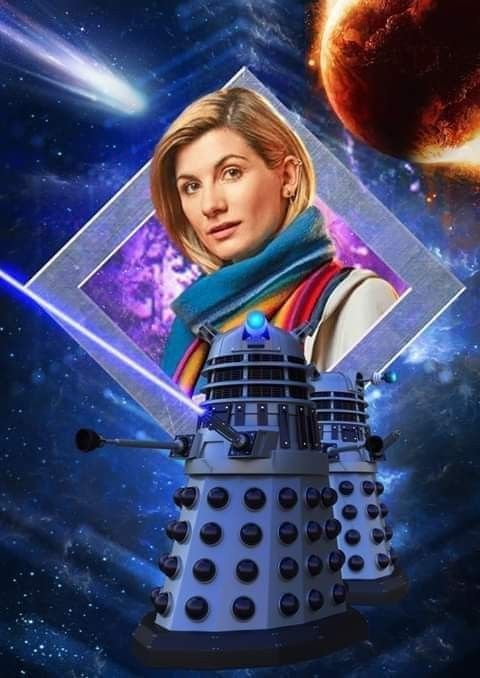
« None of us know for sure what’s out there. That’s why we keep looking. Keep your faith. Travel hopefully. The universe will surprise you. Constantly. »
First appearance: « Twice Upon A Time » (2017)
Debut: « The Woman Who Fell to Earth » (2018)
Regeneration Story: « The Power of the Doctor » (2022)
Played by: Jodie Whittaker (2017-2022)
Voiced by: Jodie Whittaker (2019); Debra Stephenson (2020)
« 'Cos sometimes this team structure isn’t flat. It’s mountainous, with me at the summit in the stratosphere, alone, left to choose. Save the poet, save the universe. Watch people burn now or tomorrow. Sometimes, even I can’t win. »
The first female incarnation in the TV series.
The cheerful and high-spirited woman with a touch of secrecy. Bright, bubbly, and fun-loving with a serious case of Attention Deficit… Ooh, Shiny!, this Doctor acts like a born adventurer with a slight air of Blithe Spirit who is very much eager to meet new friends. More so than past incarnations, she is a first-rate Gadgeteer Genius, crafting a whopping four improvised inventions in her proper debut episode alone, three of them in a single night. Her lovable lack of fashion sense hearkens back to the colourful and loud ensembles sported by Doctors of the classic era.
However, underneath her surface-level warmth and friendliness, Thirteen is possibly the most secretive of the revival era incarnations, not even disclosing her species and home planet to her companions until her second season. Ask her about her past, and she’ll deftly dance around the question; corner her into telling more about herself, and she’ll start getting curt and snippy. She tends to be emotionally distant, probably as a result of this secrecy. She refuses to let her companions in on her inner turmoil and, while she tries not to be, can be quite callous with the emotions of others. She also has a bit of a sadistic streak, relishing encounters with villains and sporting a vicious grin whenever she has the upper hand.
Although she thought she knew her identity quite well, this incarnation discovered there was a great big chunk of her personal history missing from her memories of the past. When she had to face these omissions, it caused her to feel betrayed and used, and left her unable to confront old friends and foes she saw as strangers.
Despite attempting to reconnect with them in her previous incarnation, the Doctor would soon discover that the Master had relapsed into evil after discovering a secret hidden by the Time Lords, which was enough of a shock to the system to undo his fragile redemption as Missy and drive a wedge between them yet again. As a result, he set out on causing as much suffering to Gallifrey as possible, and to punish the Doctor for being heralded as special out of envy. At the climax of this conflict, the Master actually tried to usurp the Doctor’s existence and possess her, then bastardize the Doctor’s legacy into a deranged, chaotic imitation of her. However, the Doctor’s human allies and companions, both current and former, worked to undo this plan. Unfortunately, the Master once again tried to kill the Doctor with a parting shot, and wounded her badly enough to make her regenerate. The Thirteenth Doctor said her goodbyes and peacefully underwent the process, which led to a most unusual change of appearance…
Not to Be Confused with another famous female Doctor Thirteen. Or the other Doctor Thirteen.
« I don’t know who I am anymore. »
First appearance: « The Power of the Doctor » (2022)
Played by: David Tennant (2022-2023)
« I know these teeth. »
After being fatally wounded by the Master, the Thirteenth Doctor regenerated on a cliff into a new incarnation who, for reasons unknown, looks exactly like the Tenth Doctor.
Fourteen holds a unique position as the first intentional « short-term » Doctor, starring in three 60th anniversary specials in 2023 before handing over the role to Ncuti Gatwa as the Fifteenth Doctor.note He is also one of the few Doctors (along with the War Doctor) whose post-regeneration story was depicted in expanded universe media rather than the main series itself.
- Badass Longcoat: As per the norm for the Doctor, he wears one, this time in blue.
- Big « WHAT?! »: He exclaims « What? » several times when he realizes that he has the same face as Ten.
- Borrowed Catchphrase: Once again, this Doctor utters an « Allons-y » (which was the signature catchphrase of Ten’s) before heading off into an adventure.
- Call-Back: The Curator had previously mentioned to the Eleventh Doctor that he might start revisiting a few of their old faces later down the road, specifically the « old favourites ». Though unlike with the Curator, this one seems to be entirely unanticipated on their part.
- Gender Bender: Regenerated from female back to male.
- History Repeats:
- Once again, a Doctor with a northern accent regenerates into David Tennant. To really sell the point, the first comment Fourteen says is about their teeth, just like his first words as Ten.
- It’s a regeneration into a face the Doctor has put on before (that being, again, David Tennant), although this time it was unintentional on their part while Ten went out of his way to regenerate without undergoing Death of Personality.
- Perma-Stubble: Is born with a five o’clock shadow, which makes him look somewhat less youthful than the Tenth Doctor.
- Shapeshifting Excludes Clothing: Averted. All other regeneration sequences throughout the series, except the first, have left the prior incarnation’s clothing intact on the new body. In this instance, for unknown reasons, the Thirteenth Doctor’s outfit burns away during the regeneration, leaving a different suit for Fourteen in its place. Even the Doctor is confused about this.note
- Significant Wardrobe Shift: Echoing how this Doctor is familiar but different, Fourteen’s outfit resembles a modified version of the Tenth Doctor’s, but has several changes and a few slight similarities to other Doctors. He now sports a blue Badass Longcoat instead of a brown one similar to the Fugitive Doctor, the front part of his vest is only partially buttoned and his suit and pants feature a plaid pattern reminiscent of the First and Second Doctors’ houndstooth pants, instead of Ten’s pinstripe design. Without the blue coat, his waistcoat and dress shirt also resemble those of the Eleventh Doctor in Series 7.
- Waistcoat of Style: Instead of Ten’s suit jacket, Fourteen has gone for one of these.
Et celui à venir…
